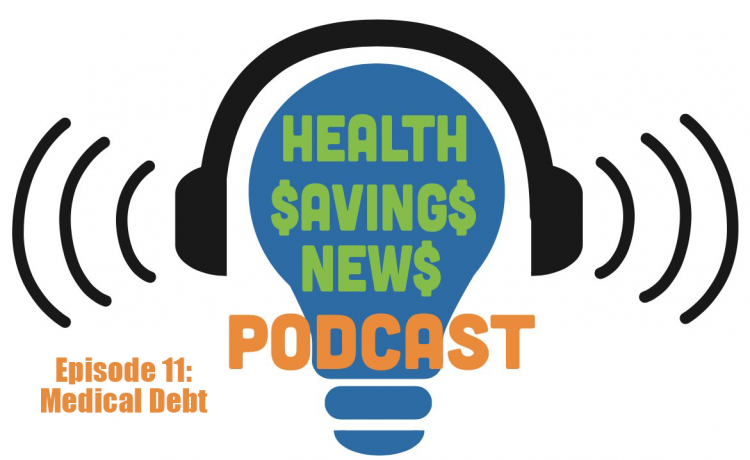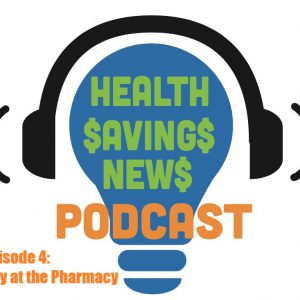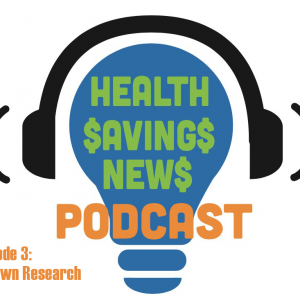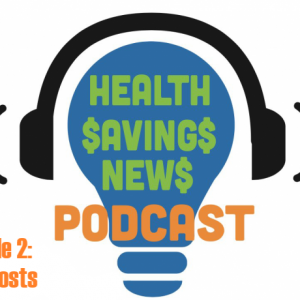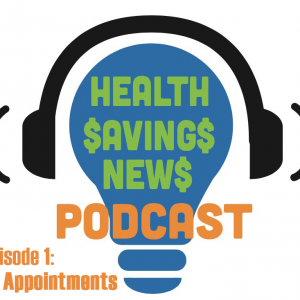Note: This is a rough transcript of episode 11 of Health Savings News and has been lightly edited for clarity. Copy may not be in its final form.
[fundraising appeal]
Evan (00:00):
Health Savings News is brought to you by NeedyMeds. Ever since NeedyMeds was founded 25 years ago, all the information on the website has been free. In the beginning there were only two part-time employees; now we have a staff of 30. When we started, we only had information on pharmaceutical patient assistance programs; now we have information on 40,000 programs covering over a dozen different types of assistance. We’ve gone from having a hundred visitors a day to the website to 10-15,000 hits now.
In the past, we have been able to cover our operating costs, but this year has been different. We’ve experienced some unexpected expenses. Due to our host going out of business, it became necessary for us to update our entire data system and website. This update will give our site visitors a much needed comprehensive search experience as a result for the first time, our 25 year history, we are facing an operational deficit in 2022. We are asking for your help to help us continue what we do as well as adding to the information that we provide. We have big plans for the future, but to accomplish them we need your help. Please consider making a donation at needymeds.org.
You can also check our blog at blog.needymeds.org for transcripts of all of our podcasts. Our most recent blog was posted on Labor Day. It’s about the health benefits of organized labor and worker solidarity. Please give it a read and thanks again for listening.
[intro music]
Evan:
Hello, and welcome to Health Savings News: the podcast about healthcare costs in America and how to save money on the often expensive care all kinds of people need. I’m your host, Evan O’Connor, joined by retired doctors, Rich Sagall and Mike Woods. Each episode we discuss healthcare costs in America, offer tips for saving money, and relevant news that affects and reflects the expensive landscape of healthcare in America.
This week’s topic is medical debt. Most Americans could easily be overwhelmed by medical expenses. Only 39% of Americans can afford an unexpected bill of over a thousand dollars. Nearly 84% of uninsured Americans could be financially devastated in the event of a medical emergency. More than a third of adults in the United States have growing medical debt, even with health insurance. High deductibles and other forms of cost sharing can contribute to individuals receiving medical bills they are unable to pay despite being insured. People with medical debt report cutting spending on food, clothing, and other household items, spending down their savings to pay for medical bills, borrowing money from family or friends, or taking on additional debts. Data from the Survey of Income and Program Participation finds people in the United States owe at least $195 billion in medical debt. Some sources put it as high as a trillion dollars. A Kaiser Family Foundation analysis showed that about 23 million Americans have medical debt of at least $250, approximately 16 million people in the U.S. owe over a thousand dollars in medical debt, and 3 million people owe over $10,000. Medical debt occurs across demographics, but people with disabilities or chronic illness, Black people, people living in poverty and rural areas, and in the states that have not expanded Medicaid are more likely to have significant medical debt.
Rich (03:44):
One important thing for people to do is to keep a diary. You want to keep a record of everything you do related to your medical debt. It’s payment, it’s collection negotiations, et cetera. This record may be the only one that combines all the different participants in your debt situation. You want to keep the diary in writing include things like the date, the time, who you speak to the topic and resolution. You want to keep it objective, not subjective. You want to keep opinions out of it. And if you’re talking to somebody on the phone and they won’t give you the information, you need to identify them such as their name, their position, their employer, their phone number, et cetera. Then don’t talk with them. You have a right to have that information and it may be a scammer or someone who’s trying to bilk you out of funds if they won’t give you that information.
Mike (04:34):
If you are at risk for going into medical debt, the first thing that you should make sure is that you actually owe the money that you are being charged for. You’d be surprised to know what percentage of medical bills will have at least one mistake, some estimated as high as 80%. So it really is important for you to know how to read that medical bill in the insurance statements in order to gain the information you need to request an itemized bill from your provider, and you should actually compare this bill with the bill that you got for the insurance company to make sure that they match. You’d be surprised at how many times providers charged for services provided that they didn’t actually provide, only thought they were going to and billed for it. And then review all of them carefully. Make sure that they’re accurate and include the appropriate personal and insurance information, since another common mistake is to have the wrong insurance attached to your bill. A very difficult thing to do is to make sure that the billing codes are correct. This doesn’t typically apply to those with insurance, but if you don’t have insurance applying the wrong billing codes can increase the cost of your medical care. What that means is, is that a doctor may have upcoded — meaning charge you for a service that is much more complicated and involved than the one that they actually gave you — and that is usually reflected in the code. Other than making sure you receive the services that you’re being charged for, make sure that you weren’t billed twice for different items. Sometimes you need to make sure that you weren’t charged for something that you shouldn’t have been. For instance, the Affordable Care Act mandates that your yearly physical should not require any payment, including copays, and that you weren’t over billed for anything on the visit. Sometimes you get, when you go to a visit, the services are bundled into an overall charge. In some cases, they will unbundle those into individual services in order to be able to charge more. In order to know what you are actually entitled to or aware of, there are a couple of things you can do. The most important is to go over your insurance policy’s Explanation of Benefits; that will tell you everything that you’re entitled to, everything that you would need to have a copay for, it keeps track of your spending limit, et cetera. There are also insurance representatives that you can call. If you are getting insurance through your company, you can talk to their healthcare advocate; and even states have insurance commissioners that you can contact to help you with an inappropriate claim. If you find anything of this nature, challenge and dispute it; it’s your right to do that. If you find any unexpected charges or surprise bills that come from out-of-network providers, this may have violated a new law that will go into place July 1st called the Hospital Price Transparency Rule that does not allow certain providers who are out of your network to add the cost of their services to your bill.
Rich (08:02):
Before you go on Mike one, I want to give a couple examples of mischarging. I want to tell you about a couple of examples of how billing errors occur. One has to do with colonoscopies. There’s more than two types of colonoscopies, but they could be divided into screening and diagnostic. A screening colon colonoscopy occurs when you’re not having any problems where a diagnostic one would occur if you were. The screening may be covered on your insurance, but the diagnostic may not be. So you have to make sure that you got charged for the right colonoscopy. Another example occurred when I was a resident way back in the dark ages. One of our assignments when we were on the ICU rotation was to look at a bill and understand it totally. And what I found was the ICU had been charging the daily rate hourly for a number of months. Now, the hospital administration wasn’t very happy about this when the error was discovered, but they had to refund a lot of money because of this, but nobody had picked it up. So these things can happen. As Mike mentioned, you want to check your bill over carefully and anything you don’t understand, contact the biller and say, “what was this for? What is this about?”
Mike (09:19):
Another issue crops up with those without insurance is that providers often charge folks who do not have insurance a higher rate than they get from insurance companies. So one of the things that you can do is you can check prices charged by providers in your area to see what is the generally charged price, and if yours is out of line with that you have more room to negotiate prices. There are a couple of organizations that can help you with that such as New Choice Health and Healthcare Cost and Utilization Project. You can also look in Medicare and Medicaid and see what they generally will pay to providers. And, again, so that you have an idea of what the cost that most people will be charged for these services. If you do have insurance, one thing you would want to do if you think that your price is higher than the price negotiated by your network is get in contact with your insurance company to find out what the negotiated price was.
Rich (10:28):
Now we should explain why cash paying patients always pay the most. And that’s because insurance companies, Medicare, et cetera, negotiate prices based upon your usual charge. If your usual charge was a hundred dollars, they may knock it down to $80 being the usual and customary that they will pay, and they pay 80% of that and the rest comes from the patient. So they have to have a higher charge, but that doesn’t mean they can’t make exceptions. And you should talk to your provider if you can’t afford some of these visits, because they may knock down the fee based upon your particular circumstances.
Evan (11:07):
We have definitely mentioned in past episodes that a lot of the prices, especially in like hospital settings, are fake. They’re not based on reality of what things cost. If you do get an outrageously high medical bill and have everything reviewed and receiving a bill for the services you’ve received, you can call their billing department and just say, “I’m not paying this, charge me less.” Because the prices are fake; they have no relation to how much the services actually cost, especially for things like bandages or over the counter medications. They could have hundred times mark up for what a patient would pay in a hospital versus what you would pay at a local pharmacy just picking up the medications yourself.
Mike (11:44):
Okay. As is the last thing to worry about with the bill is denied claims. If you get a denied claim, look into it in a lot of cases, a claim may be denied because an inappropriate billing code was used and you really didn’t receive that level of service, but actually did receive a level of service that was allowed by the insurance company. Even if you have a claim that was denied appropriately, look into that. There may be ways of getting that claim approved either by going through your primary care provider, who can then justify why they did that level of service or speak to your insurance company. Now that you’ve looked at your bill and you’ve finally decided or friendly realized that the debt is really money that you owe, what are ways that you can now work or get that medical debt down? Well, first of all, there are a lot of avenues for financial assistance for people with medical debt. It’s usually available to low-income families or those experiencing financial hardship. For example, under the Affordable Care Act, all nonprofit hospitals must have financial assistance programs available for you if you’re low-income. And as an aside, most hospitals are nonprofit. So it’s highly likely that your hospital will have this. Many other hospitals and even large medical groups will also have financial assistance programs that will allow the waiver or lowering of medical debt for those that qualify. And finally, there are many charities in other organizations that will offer financial aid for those with medical debt.
Rich (13:35):
We list many of those organizations Mike mentioned on the NeedyMeds website under the Diagnosis-Based Assistance Programs. You should look by the diagnosis to see if you can find a program that would help, or you may want to look under the All diseases where there are a number of local programs that will provide a cash grant to people experiencing financial hardship due to medical issues. So it’s well worth checking that out. And again, that’s on the diagnosis based assistance section of the website.
Mike (14:03):
So I’ve already talked about trying to negotiate fees at the time of service, but it’s actually possible to negotiate payments for debt that you’ve already incurred. So you’ll usually speak to a billing manager at the hospital facility with your provider’s options. So there are a number of things that you can discuss with this person that may help ease the burden of the debt. One is proposing a realistic payment schedule that hopefully you can even get at zero interest that will allow you to spread the payments over enough time until your financial situation resolves or that you can handle with your current budget. We talked about bundling before, but if you have been charged fees for individual service, you may be able to ask if those services can be bundled into one entire fee for the entire service that you received. Another thing you can do, we’ve talked about doing your research into what the usual charge for those services are, or what Medicare Medicaid charges for those services and ask for that price pleaing that you know, “this is what you charge everybody else. I’m not sure why you charge me more. Can I have that price as well?”
Rich (15:18):
I think during the negotiation process, it’s very important to remember the person you’re negotiating with really doesn’t want to be the bad person in this process. They have no choice. This is their job. Being considerate to them and treating them nicely can get you a lot more and then getting mad at them.
Mike (15:36):
Exactly. It’s in their best interest to get paid something. So a lot of them will negotiate certain things, realizing that if the debt goes on too long and ends up in collection, their ability to get a significant amount of payment for that service is very limited. So you can offer certain deals to them saying, you know, “if I pay a certain amount now, can we call it enough?” Or, you know, say “I’ll make a significant down payment now if you drop the charges a little bit.” So you do have ways to negotiate and surveys have found that negotiations are successful almost all the time.
Rich (16:17):
I can tell you when I was in practice, if a patient said to me, “I’m just having trouble affording this.” And they were forthright, we usually could work out some sort of a deal. And I had many patients where I said, “look, as long as you make a reasonable payment every week or every month, don’t worry about how big the bill gets, we’ll take care of you.” So being forthright about this does help.
Evan (16:38):
To that end, being forthright: you want to make sure you get any agreements with, especially — again, a big hospital — get agreements in writing. Because even if you are making payments based on a payment plan, without an agreement in writing they could still send those bills to collections — even if you’re actively paying them over time.
Rich (16:57):
That’s true. That’s true. And also doctors do have the ability to waive co-payments. They can’t do it routinely, but they can do it now and then. So you can talk to the doctor about that.
Mike (17:10):
Another thing that you might want to look into with your medical bills is using other sources of revenue to pay them. For instance, using life insurance for medical bills. There are a number of ways to use life insurance, for instance, whole life or universal life insurance policies have cash values that you can withdraw if you need to help pay these bills. In a lot of cases, you’re borrowing your own money so the interest rates are either non-existence or reasonable. If you have term life insurance, there is a type of settlement called a viatical settlement in which you can opt to sell your life insurance to a third party and they will give you a certain percentage of the value of the policy and take over the insurance policy. You may have a policy that has a cash surrender value that’s built into the insurance contract, however, like the viatical settlement, you would no longer have any life insurance to cover you. Couple of things that people do consider for paying off medical debt should be really thought about very deeply and may even try to avoid. For instance, trying to pay off medical debt with a credit card really just postpones the payment of the debt and since the credit cards charges a 13% interest rate on any payments not made immediately, you’re actually adding to your debt. The same is true if you try to take certain loans out that are high interest rate; you’re just gonna add to the problem and postpone paying the debt. If you can find a loan that’s low and no interest to do this, and there are some available, that may be a reasonable solution.
Evan (19:06):
Medical debt can affect access to credit, lead to garnished wages, or even home lienes that can lead to homelessness. Beyond that, medical debt can lead to profound emotional and mental anguish in addition to whatever condition led to the debt. 66% of all bankruptcies are associated with medical debt. 25% of all credit card debt is associated with medical debt, and of bills that are sent to collection agencies 58% involve medical debt.
Rich (19:31):
One issue you should keep in mind is you don’t want to just ignore this. When I was in practice, I would turn bills over to a collection agency if the patient stopped communicating. And I had more than one case where a former patient came back complaining that they couldn’t get a mortgage because I had turned them into collections, and which were relatively small amounts. So this can affect you down the road. It’s best to stay on top of it and not ignore them.
Mike (19:57):
The typical debt will go to collection as soon as 90 days after the bill is due. Sometimes it’ll even be up to 180 days to a year. But when we finally go into debt, it’ll be reported to credit bureaus as a medical debt accounting. And after one year for any debts over $500, your credit score will be reduced. There is a statute of limitations on medical debt. Each state has its own timeline. And although it is something to consider, there are many consequences to waiting till the statute of limitation runs out, such as inability to get certain types of insurance, consideration for hiring, and being able to get credit.
Evan (20:49):
If a collection agency calls about medical debt, tell them to provide an itemized bill with your signature pledging you’re responsible for the costs. If they cannot provide that refuge to engage with them. If they do, try to settle for less than what you owe. Collection agencies often pay pennies on the dollar to take over debt, so they’ll likely make a profit no matter what you end up paying them.
Mike (21:08):
But you need to recognize if the person calling you is actually an imposter. A lot of these scams will pose as medical, as hospital representatives and ask for personal information, medical information, and credit card numbers. That really most of the time the debt collectors will not ask for a lot of the scammers even are able to have caller ID spoofing. So when you look at the phone call coming in, it will actually have the name of your hospital and a local phone number on it that may make you think that this is a legitimate call. There are other things that should immediately make you think that the person you are talking to is an imposter. Number one, obviously is if you don’t recognize the debt that they’re talking to you about, they’re probably a scammer. Most scammers will be very vague and withhold information from you like we’ve already talked about. They may try to collect fees or other charges from you on top of the amount that you owe, but they are not entitled to these fees. They may even want to press you to make immediate payments, fees, money transfers, or other prepaid cards that would give them money immediately. They may make promises they can’t keep like, you know, “we’ll keep this medical bill off your credit report,” or, you know, “we can protect you from other unexpected outta medicine costs.” They may even threaten you with garnering your wages without a court order, or you being arrested, or having personal legal action, physical harm, or other consequences. If they use obscene or profane language, they’re most likely an imposter. Debt collectors are only allowed to call you between the hours of 8AM and 9PM. Anyone that calls you outside of those hours or calls you a number of times is probably an imposter.
Rich (23:14):
You also want to watch out for anyone that says to buy gift cards and give them the numbers. No legitimate business wants to be paid in gift cards.
Mike (23:22):
So when you get on the phone with someone like this, ask for their name, call back number, their mailing address and let them know, you’ll get back to them. If this is a legitimate bill collector, these numbers will be accurate and you’ll be able to recontact with them. You can also contact the original creditor and verify that that bill was sent to that particular crediting company. The last alternative is the worst one. And that’s declaring bankruptcy since there are different types of bankruptcies, some that actually will allow you to keep ownership of some of your property, it’s always best to hire an attorney when declaring bankruptcy.
Rich (24:04):
One other point I want to reemphasize is keeping a record of everything. Your documentation would be the only complete record and could be very important if this goes ways you don’t want it to.
Mike (24:14):
If you have put yourself in medical debt, probably the most important thing to do going forward is be proactive about your health so that you don’t run up so many medical bills, such as staying within the terms of your insurance, changing insurance plans to one that will cover more expenses, or see if you qualify for Medicaid and do all those things that you need to do to stay healthy and avoid needing medical care.
Evan (24:45):
To avoid high costs and future debt, 50% of people don’t go to the doctor when they’re sick. A recent study found that universal healthcare could have saved more than 338,000 lives from COVID-19 alone. The U.S. also could have saved over $105 billion in healthcare costs associated with hospitalizations from the disease, on top of the estimated $438 billion that could have been saved in a non-pandemic year.
[segment break]
Evan:
The last segment of each episode, we suggest some of the culture, art, entertainment, and social causes we’ve been engaged with to each other and our listeners. This week I’ll be suggesting Death Panel, a podcast about the political economy of health. Hosts Beatrice Adler-Bolton, Artie Vierkant, and Philip Rocco offer weekly reality checks about the catastrophic state of healthcare in the U.S. They discuss why these things are happening and where we might go from here. Two of the hosts, Beatrice Adler-Bolton and Artie Vierkant have co-authored the book, Health Communism: A Surplus Manifesto, which offers an overview of life and death under capitalism and argues for the global goal of divorcing capitalism from health. Health Communism is currently available for pre-order wherever books are sold.
Thank you so much for joining us for this episode of Health Savings News. Please subscribe, rate, and review us on Apple Podcast or wherever you’re listening to the show, it really does help. You can follow @NeedyMeds on Twitter, Facebook, Instagram, LinkedIn, YouTube, and you can follow @HealthSavingPod (no S at the end of saving) on Twitter for updates specific to this podcast and send questions, comments, and topic suggestions to podcast@needymeds.org. Our music is composed by Samuel Rulon-Miller. His music can be found at musicisadirtyword.bandcamp.com. The Health Savings News podcast is produced by me, Evan O’Connor. All the sources we used in our research can be found in the episode’s podcast description on our website or your podcast app of choice. Health Savings News is not intended to substitute for professional medical, financial, or legal advice. Always seek the advice of a qualified healthcare professional, or appropriate professional with any questions. Views expressed on Health Savings News are solely those as the individuals expressing them. Any views expressed do not necessarily represent views in Health Savings news, other contributors, the NeedyMeds organization, or staff. Thanks again for listening. See you in two weeks with our next episode.
Sources:
https://www.managedhealthcareexecutive.com/view/many-americans-remain-uninsured-following-layoffs
https://www.cnbc.com/2021/11/24/more-than-1-in-3-us-adults-carry-medical-debt-survey-finds.html
https://www.healthsystemtracker.org/brief/the-burden-of-medical-debt-in-the-united-states/
https://www.debt.org/medical/collections
https://www.investopedia.com/personal-finance/medical-debt-what-do-when-you-cant-pay/
https://www.supermoney.com/settle-medical-debt/
https://www.nerdwallet.com/article/finance/pay-medical-debt
https://consumer.ftc.gov/articles/debt-collection-faqs
https://www.masonfinance.com/blog/borrowing-against-life-insurance/

